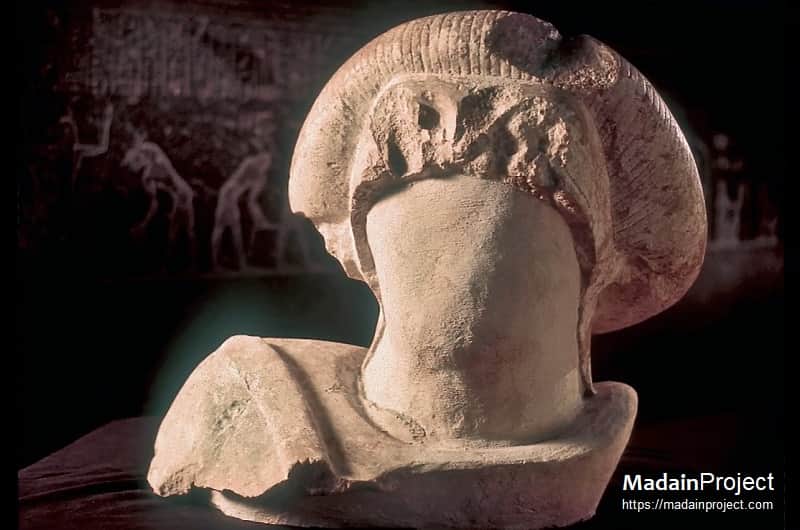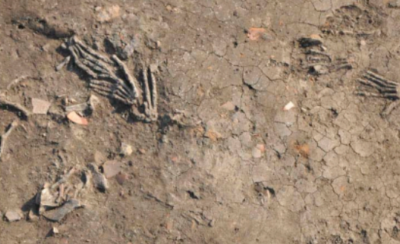Some more comments about the palace and Avaris:
The statue in the palace has a throw stick on the shoulder.

"The statue represents an official, seated and with a Throw stick held at the left shoulder."
https://www.ancientworldmagazine.com/ar ... l-el-daba/
Though the throw stick most likely represents power and authority, in ancient Egypt, throw sticks also represented hunters or foreigners, which Joseph definitely could identify as a foreigner with authority and power.
"It is used on the palettes both as a throwing-stick weapon in the animal hunt being portrayed-(the Hunters Palette),[1] as well as on certain palettes, as a determinative referring to a "foreigner", or "foreign territory".
ttps://en.wikipedia.org/wiki/Throw_stick_(hieroglyph)

As evidenced with his colorful tunic and extravagant hairdo, Joseph was most likely quite a fashionista. As a matter of fact, the Bible describes him as such an attractive man that women lusted to have sex with him.
Gen 39:6-7 (2001)
Well, JoSeph was extremely attractive... he had an excellent body and a very handsome face. And so, after he had been [put in charge of the house], his master's woman eyed JoSeph and said: '[Have sex] with me.'
The name "Avaris" could also be named after Joseph.
The word “Avaris” means nothing in Egyptian. But, in the Torah, Joseph is repeatedly called a “Hebrew”; “Ivri” in the Hebrew language. He is also repeatedly and curiously called “Ha Ish”; “The Man”. In other words, the word “Avaris” may very well be related to Joseph, the “Ish Ivri”, or the “Hebrew Man” (Genesis 39:14). All this is lost in translation when Joseph is simply called a “Hebrew”. Put differently, the so-called Hyksos capital seems to be named after Joseph the “Ish Ivri” i.e., Avar-Ish.
https://blogs.timesofisrael.com/statue- ... overed-up/
Gen 39:14 (KJV)
That she called unto the men of her house, and spoke unto them, saying, See, he hath brought in a Hebrew ("Ish Ivri") unto us to mock us; he came in unto me to lie with me, and I cried with a loud voice
Even though tombs were in the palace, no skeletal remains are found in the tombs.
Inside the burial chamber excavators found fragments of an inscribed limestone sarcophagus and a few bone fragments, but no intact skeleton as in the other tombs in the cemetery (Bietak 1991a: 61). Sometime after the burial, a pit was dug at the end of the chapel and a tunnel dug into the burial chamber. The “coffin” (sarcophagus) was then broken and the remains of the deceased removed by these “tomb robbers” (Rohl 1995: 363). It was common for tombs to be broken into in antiquity and the valuables removed, but to have the body taken is highly unusual.
https://biblearchaeology.org/research/p ... s-in-egypt
Either the bones were stolen or intentionally moved elsewhere. There's no good reason to steal bones, but there is a reason to take them away, as recorded in the Bible:
[Gen 50:25-26 KJV] 25 And Joseph took an oath of the children of Israel, saying, God will surely visit you, and ye shall carry up my bones from hence. 26 So Joseph died, [being] an hundred and ten years old: and they embalmed him, and he was put in a coffin in Egypt.
[Exo 13:19 KJV] 19 And Moses took the bones of Joseph with him: for he had straitly sworn the children of Israel, saying, God will surely visit you; and ye shall carry up my bones away hence with you.
Near the palace, 16 severed hands were found buried.

Severing enemy hands was not a practice of the Egyptians, but was a Canaanite custom that even David performed.
[2Sa 4:12 KJV] 12 And David commanded his young men, and they slew them, and cut off their hands and their feet, and hanged [them] up over the pool in Hebron. But they took the head of Ishbosheth, and buried [it] in the sepulchre of Abner in Hebron.






